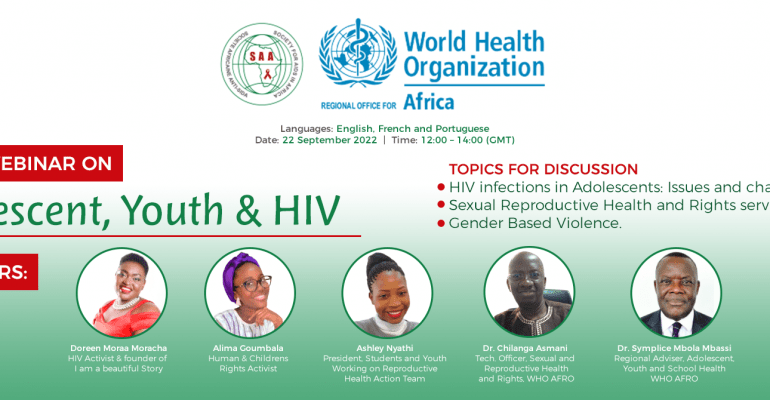The SAA/WHO AFRO ADOLESCENT, YOUTH AND HIV WEBINAR held on September 22 inspired young people and those working together with young people including all the centers affiliated to African Jesuits AIDS network (AJAN) to get out of their comfort zone and to try new roles in engaging young people to talk about HIV and gain consensus on the key issues affecting adolescents and youth including the barriers to Sexual Reproductive Health (SRH) services and core elements that put young people in all their diversities, at the center of the HIV response in the context of COVID-19.
According to the UNAIDS data 2021 report, there are 4000 new HIV Infections (adults and children) every day in 2020. Which show that the infections curve is ascending with 60% in sub-Saharan Africa; 10% are among children under 15 years of age, 90% are among adults aged 15 years and older, of whom: 51% are among women, 31% are among young people (15–24) and 20% are among young women (15–24).
The webinar gave an opportunity to share and reflect further on some of the issues and challenges contributing to high HIV infection among youth and adolescents in Africa which include Psychosocial well-being; disclosure of HIV status, Stigmatization, treatment and health which is connected to challenges in schools and larger community; financial challenges; domestic violence; sexual and reproductive health challenges; family planning, lacking access to HIV antiretroviral drugs and screening; Psychosocial support, and government policies.
Together with researchers and youths from Africa with keynote presentation from WHO AFRO. representatives. The Webinar offered summary insights from the UNAIDS 2021 report and young person’s view of the current situation of HIV infection, with civil unrest, insecurity and poverty being key factors in African countries, where hunger; lack of enough food affects those living with HIV, leading to high mortality rates among those infected and affected with HIV.
In cases such as female genital mutilations and with the increase in cases of, sexual and gender-based violence, eliminating such practices requires government, the international community and donors to strengthen commitment in eliminating the above practices, through resource mobilization, enacting and reinforcing comprehensive laws and national policies where respecting people’s choice must be taught from a young age and ending HIV/AIDS requires not just effective medical care to minimize physical suffering but also social support to help those affected cope with mental illness.
Moving forward multi-sectoral and comprehensive approach and sociocultural dynamics is needed when designing and implementing programmes that involve the Youth fighting against HIV/ AIDS which is a focus by the African Jesuit AIDS network (AJAN). Since its establishment in 2002, AJAN is here to help Jesuits in every African country where there are AIDS initiatives to respond effectively to HIV and AIDS by bringing together the people involved in a working group. 20 years down the line, the discussion now shifts on how we can provide the youth with the needed knowledge where they are trained to socialize and talk with fellow youths, their agemates, documenting success stories from different countries in the African continent.
While the mandate of AJAN, besides several others is to Keep HIV & AIDS on the Agenda of the Jesuits, the Church and the rest of society, implementing the Universal Apostolic Preference (UAP) of the Jesuits, number three, which is namely “Accompanying the young people in the creation of a hope-filled future” we take lessons from the Webinar on Adolescents, Youth and HIV, that continuity and ability to build lasting relationships with the Youth on sexual education is a key to success and it requires establishing a grassroot approach, setting up programs that involve the youth, exploring sustainable practices together with local residents in the area, is sure a better way of not only educating the youth but the whole society at large.
For the live webinar presentation kindly visit: https://www.saafrica.org/pages/who-afro-saa-adolescent-youth-and-hiv-webinar/
By Dennis Owuoche,
AJAN Communications and Research Officer

